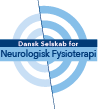
- Denne begivenhed er allerede afholdt.
OE-kursus Rigshospitalet Glostrup 26-28/januar 2023
26. januar 2023 - 28. januar 2023
3.800,00DKK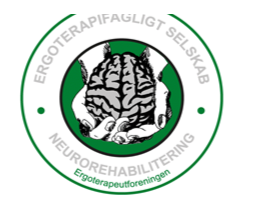 Dansk Selskab for Neurologisk Fysioterapi annoncerer igen 3 kurser med australske undervisere.
Dansk Selskab for Neurologisk Fysioterapi annoncerer igen 3 kurser med australske undervisere.
Denne gang til Glostrup og Grindsted. 2stk OE kurser og 1stk UE kursus.
Det er Simone Dorsch (fys) og Lauren Christie (ergo) som er underviserne denne gang.
Kurserne foregår på engelsk.
OE kurser 2023
Tid og sted:
3-day upper limb workshop Rigshospitalet Glostrup
Date: 26th-28th January 2023
Adresse: Valdemar Hansens vej 1-23, 2600 Glostrup

Deltagere: 22 fysio- eller ergoterapeuter på hvert kursus.
Kun fysioterapeuter som er medlem af Dansk Selskab for Neurologisk Fysioterapi kan deltage.
Kun ergoterapeuter medlem af Ergoterapeutfagligt Selskab for Neurorehabilitering kan deltage. Man kan melde sig ind og deltage.
Pris: 3800kr for 3-dags kursus, incl. forplejning under kurset.
Tilmelding: via www.neurofysioterapi.dk – OBS!!! bindende tilmelding og max. 2 pr. arbejdsplads (Dette for at sikre geografisk spredning. Hvis kurset ikke fyldes op kan flere fra samme arbejdsplads deltage).
OBS: Kun medlemmer af enten Dansk selskab for Neurologisk Fysioterapi eller Ergoterapifagligt selskab for Neurorehabilitering kan deltage. Man kan melde sig ind og dermed deltage.
Kontakt v. spørgsmål: sinesecherm@hotmail.com
Tilmeldingsfrist: Bemærk sidste tilmelding 15.december 2022 – af hensyn til de deltagere som ønsker at betale kurset i 2022.
Information om kurset:
‘Evidence-based upper limb retraining after stroke’
This course focuses on helping therapists to minimize upper limb impairments post-stroke and increase engagement in activities. Workshop notes and content will be based on published research and movement science/motor relearning. Since first being run in 1993, workshop content has been regularly updated to incorporate new evidence.
Learning Objectives:
By the end of the 3 days, participants will be able to:
- Name the essential components of normal reach and manipulation.
- Recognize common compensations when observing stroke survivors attempting to grasp objects and explain how to minimize compensatory strategies.
- Name and discuss factors thought to contribute to the development of muscle overactivity, spasticity and stiffness, and intervention strategies to help minimize these secondary problems.
- Explain the relationship and differences between overactivity, spasticity, muscle length changes and stiffness, missing essential components and compensations.
- Plan and conduct an assessment and training session with a stroke survivor using motor learning principles and task-specific practice.
- Discuss factors which affect motor learning and can be modified to enhance learning and increase client practice.
- Use an electrical stimulation machine to stimulate upper limb muscles.
Discuss current evidence for constraint-induced movement therapy, mental practice, mirror box therapy and electrical stimulation for improving upper limb motor recovery
Practical work during the course:
Numbers of participants are restricted because there are clinical sessions involving 8 people with stroke and small groups of 3 therapists. The course presenters assist these teams of therapists to assess and establish a training program for all 8 people with stroke.
Target audience:
The course is aimed at occupational therapists and physiotherapists who work with stroke survivors (inpatients and community). Therapists working with people affected by traumatic brain injury and other neurological conditions will find the workshop relevant, however, most of the examples provided, and all participant volunteers have had a stroke. Pediatric therapists may also find the workshop helpful, but all examples used will be adult patient groups.
Undervisere:
Simone Dorsch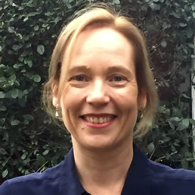
Simone is a physiotherapy clinician, researcher, and educator. She has 20+ years’ experience in stroke, brain injury and aged care rehabilitation. Simone is a senior lecturer at the Australian Catholic University in North Sydney.
Research and publications: Simone have published 12 peer reviewed journal articles. Her research focuses on the relationship between loss of strength and activity limitations and strategies to increase practice intensity in rehabilitation and improve outcomes.
Lauren Christie 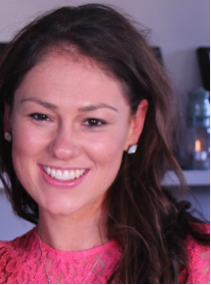
Dr Lauren Christie PhD, BAppSc (Occupational Therapy). Senior Implementation Science Research
Fellow- Allied Health, Allied Health Research Unit, St Vincent’s Health Network, Sydney
Lauren is an occupational therapist clinician-researcher and clinical fellow of Australian Catholic University. She is the Senior Implementation Science Research Fellow- Allied Health for St Vincent’s Health Network Sydney, Australia where she leads the Allied Health Research Unit and supports frontline allied health clinicians to engage in and conduct research, with a focus on knowledge translation. She has 15+ years’ experience in stroke, traumatic brain injury and general rehabilitation.
Research and publications: Lauren has been awarded over $800,000 in research funding and published 12 peer reviewed journal articles. Her research program focuses on the implementation of effective interventions across the continuum of stroke recovery, upper limb rehabilitation and consumer decision making.
| Workshop Timetable/ program – Upper limb workshop | ||
| Day 1 | ||
| Revised timetable with 10am start | ||
| 10.00-10.15am | Housekeeping, introductions; workshop overview | |
| 10.15-11.45am | Session 1 | Movement Analysis 1: Essential components of reach and grasp (cup, pen, cutlery, brush). Anatomy revision. |
| 11.45-12.15pm | Session 2 | Movement Analysis 2: missing components and compensations |
| 12.15-13.00pm | ** LUNCH ** (45 mins) | |
| 13.00-14.00pm | Session 2 | Movement Analysis 2: cont….. |
| 14.00-14.45pm | Session 3 | Being an Effective Coach 1: Focus on goal setting, feedback, practice intensity and measurement, with feedback video. |
| 14.45-15.45pm | Session 4a | Demonstration 1: Analysis and training of stroke participants 1 and 2; provision and set-up of overnight practice by tutors |
| 15.45-16.00pm | ** AFTERNOON TEA ** | |
| 16.00-17.00pm | Session 4b | Demonstration 2: Analysis and training of stroke participants 3 and 4; provision and set-up of overnight practice by tutors |
| 17.00-17.30pm | Meet for discussion and questions (Evaluation form) | |
| Day 2 | ||
| 08.00-9.30am | Session 5 | Spasticity and muscle length changes: Implications of evidence for clinical practice. Stretching, splinting, casting & Bont-A |
| 9.30-10.10am | Session 6 | Being an Effective Coach 2: Focus on equipment and setting up exercises |
| 10.10-10.30am | ** MORNING TEA ** | |
| 10.30-12.15am | Session 7 | Being an effective Coach 2 (continued) |
| 12.15-13.00pm | ** LUNCH ** (45 mins) | |
| 13.00-13.45pm | Session 8a | Clinical Session 1: Presenters review practice from Day 1. |
| 13.45-14.00pm | Groups meet and plan for clinical session | |
| 14.00-15.30pm | Session 8b | Clinical Session 2: Groups assess /analyse (20 mins) together, then take turns training a new stroke participant. Aim for 300 repetitions. Write up /video overnight practice for hospital/home. |
| 15.30-16.00pm | ** WORKING AFTERNOON TEA **
Groups meet and discuss clinical session including coaching |
|
| 16.00-16.30pm | (Evaluation form). Meet for debrief and discussion as a large group | |
| Day 3 | ||
| 08.00-10.15am | Session 9 | Evidence of Therapy Effectiveness – Lectures with videos and practical: (i) Electrical stimulation (ii) Mental practice (iii) Constraint induced movement therapy (iv) Mirror therapy |
| 10.15-10.30am | ** MORNING TEA ** | |
| 10.30-12.15am | Session 9 continued | |
| 12.15-13.00pm | ** LUNCH ** (45 mins) | |
| 13.00-13.45pm | Session 10a | Clinical Session 3: Groups review practice and goals for stroke participant from Day 2. Re-measure performance. Progress practice. |
| 13.45-14.00pm | Stroke participant break. Groups provide verbal handover to the next group, including suggestions for training. Plan tasks to analyse, equipment needed and sequence of coaches | |
| 14.00-15.00pm | Session 10b | Clinical Session 4: Groups assess /analyse together, then take turns training a 2nd stroke participant. Aim for 300 repetitions. Audio-record yourself coaching. Observe and document other therapists giving feedback. Set-up /video take-home practice. |
| 15.00-15.30pm | ** WORKING AFTERNOON TEA **
Groups meet and discuss clinical session including coaching |
|
| 15.30-16.00pm | Review of clinical session. Discussion of Qs arising over 3 days. Statement of goal intentions. Complete evaluation form | |
| 16.00pm | *** FINISH **** | |
- Ændringer i programmet kan forekomme.
For more details: www.StrokeEd.com (Facebook page: StrokeEd)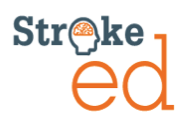
Established in 2011, the StrokeEd collaborators aim to provide evidence-based workshops that improve the skills, knowledge and practice of students and neuro-rehabilitation therapists, and influence the delivery of physical rehabilitation services to stroke survivors.
All four members of the StrokeEd Collaboration are:
- Experienced clinicians, educators and active researchers
- Recognised leaders in their profession
- Higher research degree graduates (PhD or masters by research)
- Providers of rehabilitation in public and/or private health, including tele-rehabilitation
- Registered physiotherapists and occupational therapists
Our Mission: To teach evidence-based stroke rehabilitation, to optimise recovery post-stroke
Our Vision
- That graduate physiotherapists and occupational therapists have the skills, knowledge, confidence and competence to routinely deliver evidence-informed physical rehabilitation
That stroke survivors receive prompt, evidence-based rehabilitation regardless of their geographic location, ability to pay, age or the experience of treating therapists

